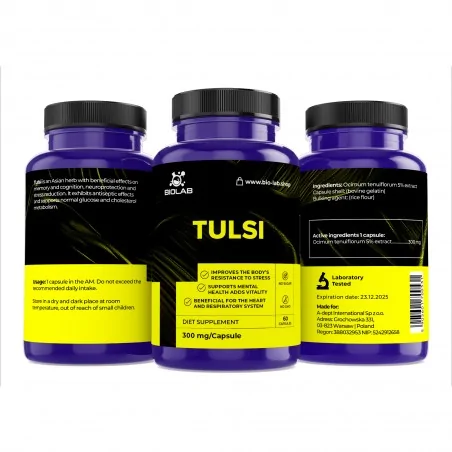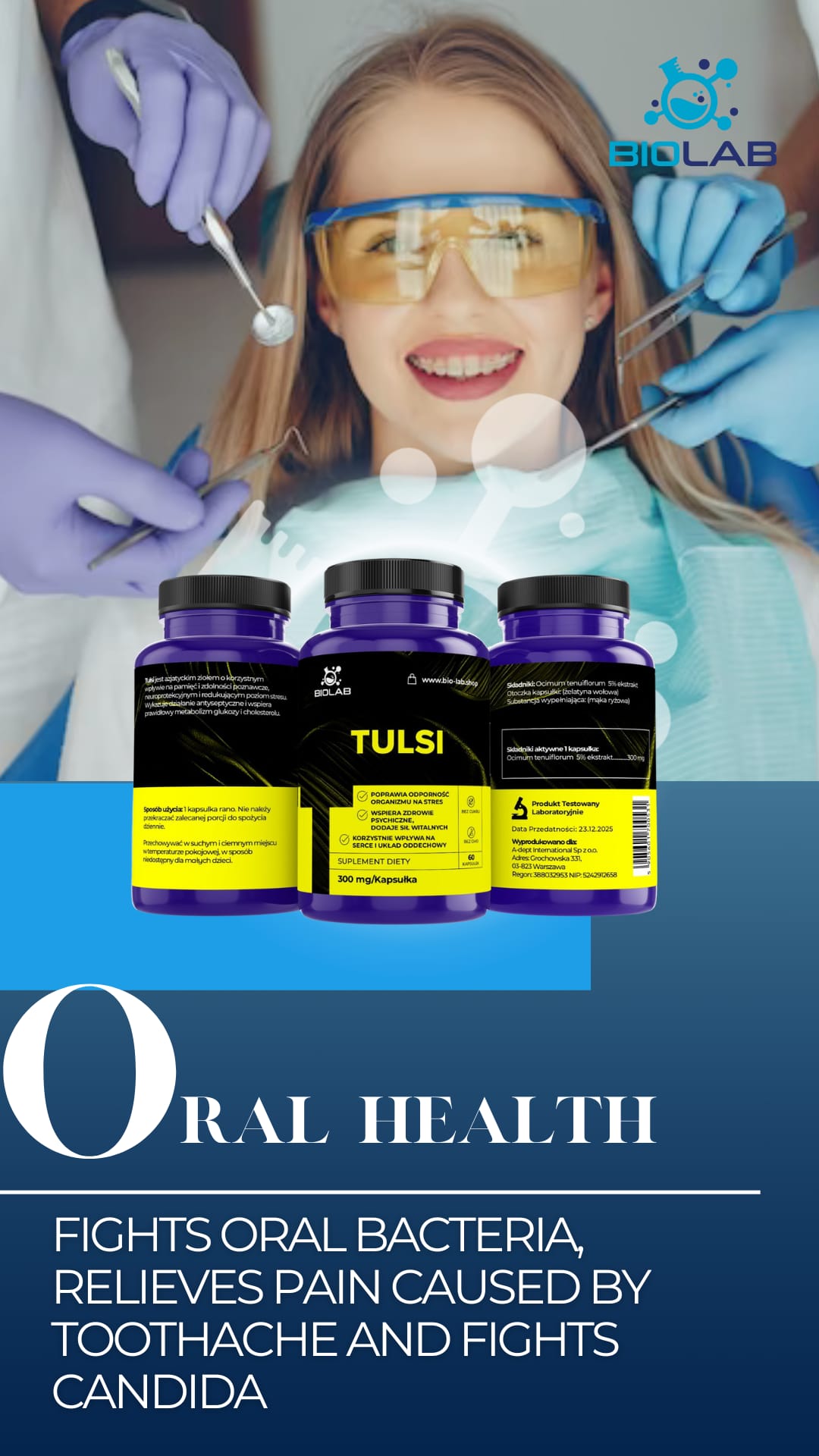
TULSI 300mg
Product code:
Buy 3 and get 3% discount
Buy 5 and get 5% discount


Product code:


















TULSI 300mg
Called the queen of all herbs, Tulsi is widely used in Ayurvedic and naturopathic medicine, which aids in healing naturally. 
Stress / Anxiety
Tulsi benefits many types of stress, including physical, mental and metabolic. For physical stress, Tulsi is a powerful antioxidant, supporting the body in its detoxification efforts. It increases the activity of endogenous antioxidants and antioxidant enzymes, such as glutathione and superoxide dismutase. If we are mentally and emotionally stressed, the level of free radicals in the body increases. Holy basil has been shown to reduce cortisol (the stress hormone), due to its rich phytochemical content. Three specific compounds are responsible for this action: ocimumosides A and B, and 4-allyl-1-O-beta-D-glucopyranosyl-2-hydroxybenzene - the latter has shown anti-anxiety properties in the laboratory. As an herbal adaptogen, Tulsi helps restore balance to the endocrine system and hormones. Hormonal imbalances can cause a host of problems, including insomnia, fatigue, digestive problems, depression, weight gain and more. The Journal of Ayurveda and Integrative Medicine reports that Tulsi has anti-anxiety and antidepressant properties that are comparable to diazepam and other antidepressants. One study found that people who took 500 mg of Tulsi extract daily experienced significantly less anxiety and depression and felt more sociable.
https://www.liebertpub.com/doi/abs/10.1089/act.2008.14101?journalCode=act&
Oral health
Chewing Tulsi leaves to support dental health has been part of Indian culture for thousands of years. Modern science has discovered that the herb contains many phytochemicals that fight oral bacteria, relieve toothache pain and combat Candida. Containing antimicrobial agents such as caracrol and tetpene, Holy Basil may be an effective remedy for common oral infections. A study published in The Journal of Clinical and Experimental Dentistry found that a mouthwash containing Tulsi "was comparable to chlorhexidine in terms of antiplatelet effect, with no statistically significant difference between the two." In addition, the same study found that the herb does indeed have strong antibacterial properties. It was shown to be effective against two proven periodontopathogens, P. intermedia and F. nucleatum.
https://www.ncbi.nlm.nih.gov/pmc/articles/PMC4312674/
Respiratory health
Tulsi leaves are rich in the compounds camphene, eugenol and cineole, which help relieve congestion and provide relief from symptoms of many other respiratory disorders. In the case of asthma, a study of asthma patients showed that 500 mg of dried Tulsi leaves taken three times a day improved vital capacity and provided relief of asthma symptoms within 3 days. Holy basil is also "anti-cough," meaning it helps relieve persistent coughs and has immunomodulatory properties. Thanks to its anti-allergic and anti-inflammatory properties, Tulsi is also effective in treating allergic respiratory disorders such as hay fever.
https://www.ncbi.nlm.nih.gov/pmc/articles/PMC5376420/#!po=32.5000
One of the most interesting facts about the chemical composition of the Tulsi plant is that it is extremely complex, resulting in different levels of chemicals in each sample. The different chemical composition of each plant depends on environmental factors such as soil, altitude and Tulsi variety. It has even been found that individual Tulsi plants grown in the same field can vary greatly in chemical composition. In trace elements, Tulsi contains vitamin A and C, as well as zinc, iron, chlorophyll and phytonutrients. The following are typical phytochemicals that can be found in varying amounts in each plant:
Tulsi can reduce the effectiveness of blood clot formation. It is recommended to stop taking Tulsi two weeks before a planned surgical procedure.

Your review appreciation cannot be sent
Report comment
Report sent
Your report cannot be sent
Write your review
Review sent
Your review cannot be sent
Customers who bought this product also bought:
METABOLIC BOOST (SLU-PP-332)
N-ACETYL SEMAX SPRAY 50mg
BPC-157 ARG + KPV BLEND
Peptide consultations
TB-500 + BPC-157 BLEND
OXYTOCIN SPRAY 10mg
N-ACETYL SELANK 10mg
FOCUS ZONE ( J-147 ) 10mg
Newsletter
SIGN UP AND STAY UP TO DATE!
We specialize in wholesale and retail supply of high quality peptides.
Category
Our company
Add to wishlist
((title))
Sign in
You need to be logged in to save products in your wishlist.